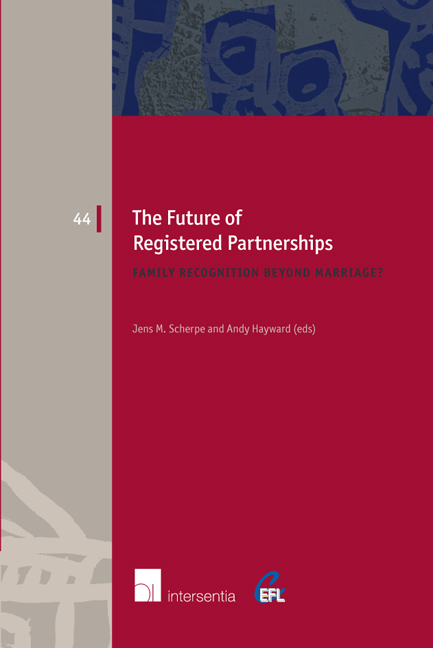Book contents
- Frontmatter
- Foreword
- Preface
- Contents
- List of Contributors
- The Future of Registered Partnerships: An Introduction
- Questionnaire
- Part I Registered Partnerships as a Functional Equivalent to Marriage
- Part II Registered Partnerships as an Alternative to Marriage
- Part III Registered Partnerships in a Time of Transition
- Part IV Alternative Models for Registered Partnerships: Beyond Conjugality, Beyond Formality
- Registered Partnerships in Spain
- Registered Partnerships in Belgium
- Registered Partnerships in Australia
- Registered Partnerships in New Zealand
- Part V Registered Partnerships, Discrimination and Human Rights
- Part VI Comparative Perspective and Conclusions
- Index
- European Family Law Series
Registered Partnerships in Australia
from Part IV - Alternative Models for Registered Partnerships: Beyond Conjugality, Beyond Formality
Published online by Cambridge University Press: 22 September 2018
- Frontmatter
- Foreword
- Preface
- Contents
- List of Contributors
- The Future of Registered Partnerships: An Introduction
- Questionnaire
- Part I Registered Partnerships as a Functional Equivalent to Marriage
- Part II Registered Partnerships as an Alternative to Marriage
- Part III Registered Partnerships in a Time of Transition
- Part IV Alternative Models for Registered Partnerships: Beyond Conjugality, Beyond Formality
- Registered Partnerships in Spain
- Registered Partnerships in Belgium
- Registered Partnerships in Australia
- Registered Partnerships in New Zealand
- Part V Registered Partnerships, Discrimination and Human Rights
- Part VI Comparative Perspective and Conclusions
- Index
- European Family Law Series
Summary
HISTORY AND BACKGROUND
Australia is a federal jurisdiction and the federal government has legislative power over certain matters pertaining to the recognition of relationships (specifically ‘marriage’), while the States and Territories have jurisdiction over other related matters (relevantly de facto and other non-marital relationships). Spread across this federal/State and Territory divide are three primary forms of adult relationship recognition: marriage; de facto relationships; and registered relationships. Additionally, New South Wales recognises ‘domestic relationships’, which are not registered but largely mirror the (formally recognised) ‘caring relationships ’ in Tasmania and Victoria, and afford people who are in a relationship characterised by ‘domestic support and personal care’ access to certain rights in property settlement and succession law.
Community data collected during the 2016 census revealed that 10.4 per cent of Australians aged 15 years and over were in a ‘de facto marriage’, 8,001,138 (47.7 per cent) were in a registered marriage, and 46,800 reported living as a same-sex couple. Given that registration of non-marital forms of relationship occurs on a State/Territory basis, it is difficult to obtain up-to-date, official data on rates of registration. However, using Queensland as an example, 1,227 same-sex couples and 6,856 opposite-sex couples had registered their relationships between the introduction of the registration scheme in 2012 and November 2015.
BASIC STRUCTURES OF THE LAW ON ADULT RELATIONSHIPS
As noted, three primary forms of adult relationships are legally recognised in Australia: marriages; de facto relationships; and registered relationships. Whereas the federal government is responsible for the recognition, regulation and dissolution of marriages (as well as financial, parental and other consequences), the States and Territories are responsible for the recognition, regulation and dissolution of other, non-marital relationships. This division of jurisdiction meant that for many years the (federal) Family Court was precluded from determining property and parenting disputes between de facto couples (but could decide those matters in the context of married couples). To fill this lacuna all States and Territories bar Western Australia 4 referred their power to decide such disputes to the federal government. This means that couples who satisfy (or, more accurately, satisfied) the definition of ‘de facto’ in the Family Law Act 1975 (Cth) (‘Family Law Act’) are entitled to the same parenting and property remedies (all other relevant factors permitting) as formerly married/ separated spouses.
- Type
- Chapter
- Information
- The Future of Registered PartnershipsFamily Recognition Beyond Marriage?, pp. 411 - 438Publisher: IntersentiaPrint publication year: 2017



